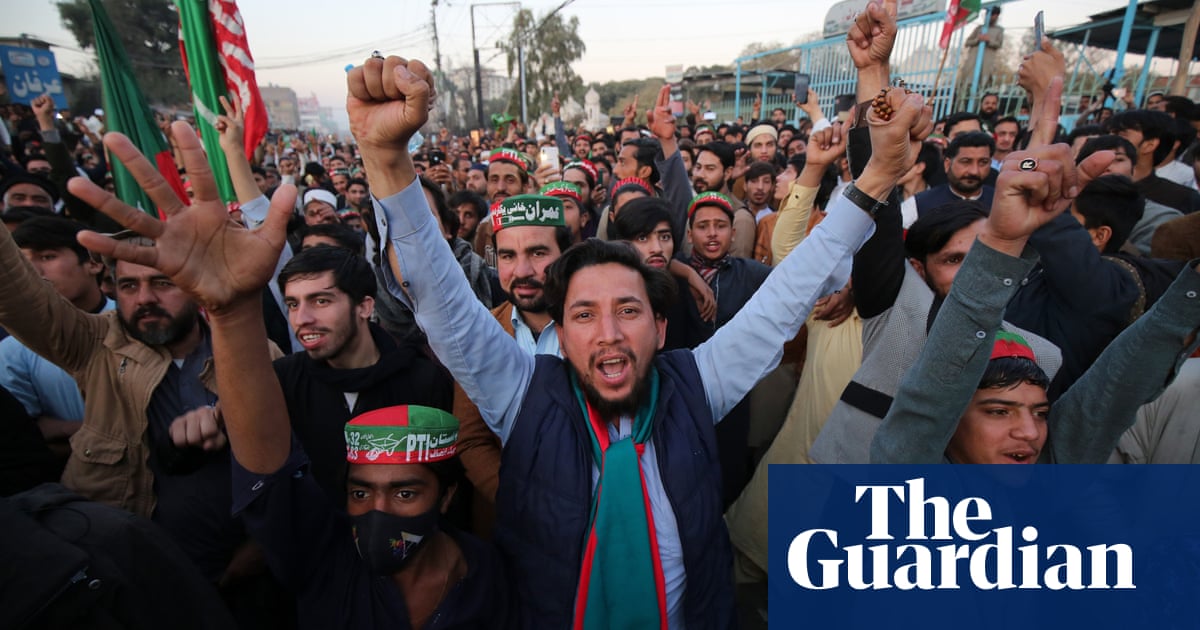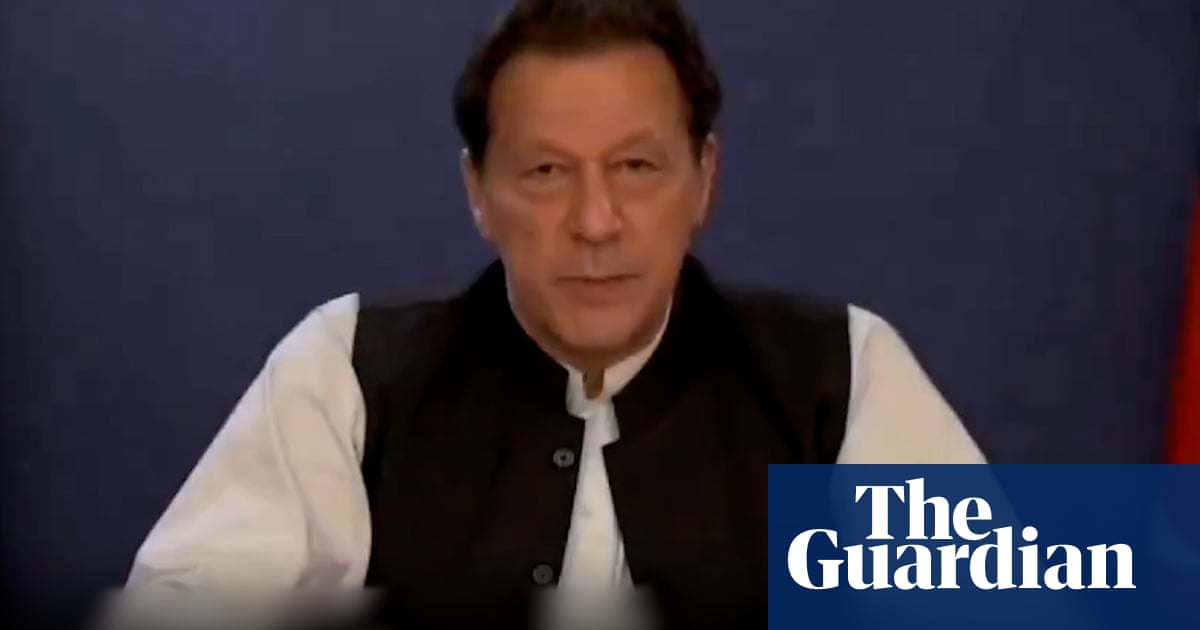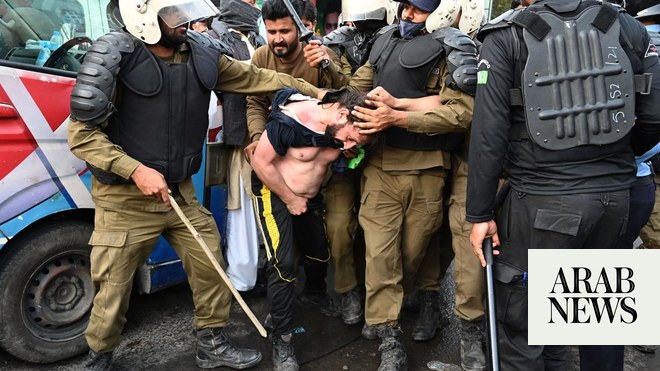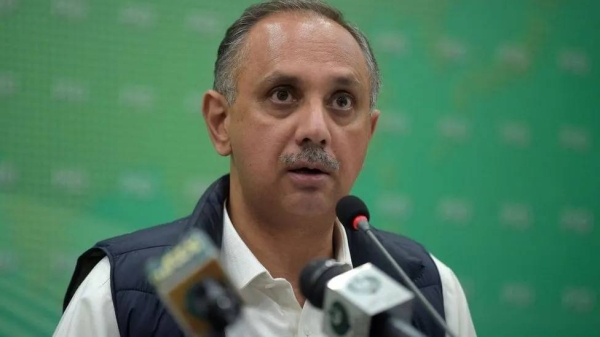
Politicians allied with the former prime minister Imran Khan’s party have defied a military-led crackdown and alleged widespread rigging to win the most seats in Pakistan’s election, but opponent Nawaz Sharif claimed victory and said he would form a coalition government.
Candidates backed by Pakistan Tehreek-e-Insaf (PTI), the party run by Khan who is now serving sentences of more than a decade in jail, claimed a stunning victory after Thursday’s polls, defying all expectations that Sharif, a three-time former prime minister, and his Pakistan Muslim League (PML-N) would win an easy majority.
Khan declared victory in an audio-visual message created using artificial intelligence and shared on his X social media account, calling on his supporters to celebrate a win that was achieved despite what he called a crackdown on his party.
Sharif was seen to have the backing of Pakistan’s military, which has long been the country’s political power broker and has a history of meddling in its elections.
Voters across the country, however, appear to have come out in unprecedented numbers to support PTI and Khan. Given the scale of the votes for PTI-backed candidates, according to sources the military was unable to “manage” the results for Sharif as planned.
With more than three-quarters of the votes counted for the 265 seats in the national assembly, PTI-backed candidates had won more than 90 seats, PML-N 69 and the Pakistan People’s party (PPP) 52.
However, without a simple majority, analysts agreed it would be a challenge for PTI to form a government. Due to an election commission ruling, PTI candidates had not been allowed to campaign under their party name or symbol and so had to be registered as independents.
Despite not leading in the polls, Sharif gave a “victory” speech on Friday night and invited other political parties “to join us to form a government”. It is understood PTI was not included in this offer. Sharif’s comments suggest that if a deal can be reached, the next government will be formed as a coalition of PML-N, PPP and other smaller parties – but without PTI or Khan.
The same parties came together in a coalition in 2020 and ousted Khan as prime minister two years later. They were in government for 16 months, when they were largely unpopular due to the country’s continuing economic crisis.
PTI leaders hit back at Sharif, claiming he had no right to claim victory or form a government. They pointed to widespread allegations of rigging in favour of PML-N candidates and said the true number of seats their party had won was much higher. The vote count was delayed for more than 24 hours in some districts and in some cases reversed overnight against PTI.
Two people were killed after protests against alleged rigging of seats erupted in Khyber Pakhtunkhwa and Balochistan provinces, where police are alleged to have retaliated with violence, and PTI supporters also came out on to the streets of Lahore. More rallies against alleged rigging have been planned across the country.
A statement by the UK foreign secretary, David Cameron, voiced concern over “significant delays to the reporting of results and claims of irregularities in the counting process”.
Shahid Khaqan Abbasi, who was prime minister between 2017 and 2018, said he feared that Sharif’s suggested coalition, without the inclusion of PTI, would only bring more resentment and instability to Pakistan at a time of severe economic crisis.
“The legitimacy of these elections has come into serious doubt so they will have no credibility in the eyes of the people,” Abbasi said. “The only way they can obtain legitimacy is to include Imran Khan. Any solution without Khan will not be workable. But the question is: will the [military] establishment accept that?”
The lead for Khan’s party came as a shock to many. He is loathed by many in the military leadership after he had a fallout with senior generals and was toppled from power in 2022.
The military has since led a sustained attack on Khan and his PTI, making it clear it would not tolerate his return to power. Over the course of months, PTI leaders and workers were arrested and their candidates prevented from campaigning. On polling day, the government suspended all mobile services, including internet access, in a move widely seen as intended to hurt PTI’s voter turnout.
Khan was arrested in August and last week he received three separate jail sentences that could keep him behind bars for more than a decade.
His popularity has soared in recent months, however, as voters have become increasingly frustrated at the military’s brazen interference in politics.
The surge in support for Khan on election day was evident at polling stations across Islamabad’s NA-47 district visited by the Guardian. From first-time voters to elderly women born before Pakistan was established, and from labourers to tech workers and lawyers, the overwhelming majority said they were voting for PTI, or as many put it, giving their full backing to Khan.
However, while initial results showed in favour of PTI, allegations of inconsistencies and rigging began to emerge on Thursday night. Declarations of results began to slow down and then stopped altogether. Polling agents began to say they were unable to collect results and then there was a reported “technical error” in counting.
TV stations were said to have received instructions to stop reporting the results. The suspension of mobile internet access, justified on the basis of keeping polling stations safe, continued long into the night after voting had finished.
More votes were said to have been counted than voters registered in Nawaz Sharif’s constituency, while the officer overseeing the count was transferred abruptly on Friday morning, allegedly for medical reasons.
In a Lahore constituency, the PTI candidate Salman Akram Raja went to the high court on Friday to challenge the result in which he lost to a PML-N candidate despite having a significant majority on Thursday night. He alleged that he and his wife had been removed from the polling office as they tried to observe the count.
In NA-47, the central Islamabad constituency visited by the Guardian on polling day, the PTI candidate Shoaib Shaheen said officials had declared him a clear winner on Thursday night with a majority of more than 50,000 votes. By Friday afternoon, however, the seat had been awarded to PML-N, to a candidate who is a close ally of Sharif.
Standing outside the office of the election commission in protest, Shaheen accused it, the judiciary and the military of colluding to rig the election and said he would be challenging the result in the courts.
“We can see clearly how corrupt and broken the system is,” he said. “My constituency is in the heart of the capital; the supreme court, the high court, parliament house, the election commission, all are located here. If they can change and rig the elections here, think what they are doing in the rest of the country.”
Non-PTI candidates also alleged irregularities. Mustafa Nawaz Khokhar, who was standing as an independent in Islamabad and had already voiced fears of vote manipulation, said the PTI candidate in his constituency was clearly winning but that the seat had been declared for the PML-N. “This is the worst kind of rigging and playing with fire,” Khokhar said.












